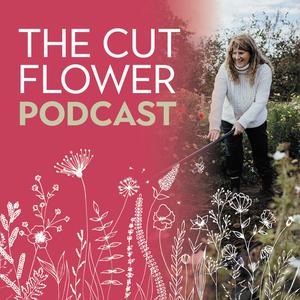
The Cut Flower Podcast
Roz Chandler
If you love cut flowers you are in the right place. The host Roz Chandler has been a cut flower farmer for nearly ten years and is passionate about helping others to have their own cutting patches. This podcast is for you if:-. You currently grow or want to grow cut flowers for pleasure or profit and be part of a growing community. Your host is passionate about reducing the number of cut flowers travelling many thousands of miles from across the globe and therefore helping to reduce the carbon footprint on our planet for our children and their children. Cut flower guests will join us on this journey. We look forward to welcoming you to our community. We would love you to subscribe to this podcast and join our communities online. We do have two Facebook groups:-For Beginners and those looking to grow for pleasure - https://www.facebook.com/groups/learnwiththecutflowercollectiveFor those wanting to start flower farming or indeed are flower farmers:-https://www.facebook.com/groups/cutflowerfarming
- 44 minutes 32 secondsGrowing Cut Flowers in Small Spaces with Stephanie Walker
Text Agony Aunt Roz with your Cutflower Questions.
Hi, and welcome to another delightful episode of The Cutflower Podcast! I’m Roz Chandler, your host, and today I’m thrilled to chat with Stephanie Walker, a micro flower farmer, author, and cut flower enthusiast based in Queen Creek, Arizona. Stephanie shares her inspiring journey from reluctant gardener to a published author and successful grower. Her book, How to Grow Flowers in Small Spaces, is an essential guide for anyone dreaming of a flourishing garden, regardless of space constraints.
In this episode, Stephanie and I explore how small-scale flower farming is not only possible but incredibly rewarding. We talk about the best flowers to grow in containers, soil care, irrigation, and succession planting, as well as the unique challenges and joys of running a flower business. Stephanie also shares her experience writing her book, the importance of planning, and how flowers bring people together through shared memories and joy.
Whether you’re a seasoned grower or just starting out, this episode is packed with tips and inspiration to help you embrace flower farming in any space.
Resources and Links:
- Stephanie Walker’s Book: How to Grow Flowers in Small Spaces (Available at Amazon, Barnes & Noble, and more).
- Follow Stephanie on Instagram: @StephanieWalkerFlowers.
Join the Conversation:
Have a question or a story to share about growing flowers in small spaces? Join us in the conversation on social media or in our community group. Don’t forget to subscribe to The Cutflower Podcast for more insights, inspiration, and expert tips!
If you enjoyed this episode, please leave a review, share it with your fellow flower enthusiasts, and subscribe for more exciting episodes. We’re here to help you grow the garden of your dreams, no matter how small your space may be!
Enjoyed this chat? Let us know your favourite takeaway or tag us with your container garden ideas. 🌸
New Catalogue Out Now, https://plantsofdistinction.co.uk use the code CUTFLOWER30 for 30% off your order.
First Tunnels, leaders in domestic and commercial product tunnels.
- https://www.facebook.com/groups/thecutflowerkickoff2025
- https://fieldgateflowers.kartra.com/page/newsletters
- A Cut Above Waitlist: https://fieldgateflowers.kartra.com/page/ACutAboveWaitlist
- The Growth Club: https://fieldgateflowers.kartra.com/page/thegrowthclub
- Lots of free resources on our website: https://thecutflowercollective.co.uk/cut-flower-resources/
- Instagram: https://www.instagram.com/fieldgateflowers
- Facebook Group 'Cut Flower Farming - Growth and Profit in your business' https://www.facebook.com/groups/449543639411874
- Facebook Group 'The Cut Flower Collection' https://www.facebook.com/groups/cutflowercollection
17 January 2025, 6:00 am - 14 minutes 2 secondsGrowing Cut Flowers as a Side Hustle or Business
Text Agony Aunt Roz with your Cutflower Questions.
Hi, I’m Roz Chandler, and welcome to The Cut Flower Podcast! This January, I’m excited to bring you a special five-episode series all about the benefits of growing your own cut flowers. Today, I’ll share how to start growing flowers as a side hustle or even transition into a full-fledged business.
Episode Summary
In this episode, I share my journey from starting with three raised beds to managing a thriving five-acre flower farm. Whether you’re looking to sell at local markets, supply florists, or offer DIY wedding buckets, I’ll guide you through the first steps. I’ll cover how to start small, grow sustainably, and set the foundations for a profitable venture.Key Takeaways
- Start Small: When I started, it was just three raised beds. Even a small garden or a 1-square-meter plot can yield significant results with planning.
- Plan Your Flowers: Choose customer favorites like sweet peas, dahlias, and cosmos. Think about who you want to sell to—florists, markets, or DIY brides—and tailor your choices.
- Sustainability Matters: Growing your own flowers reduces reliance on imports and eliminates the need for harmful pesticides. It’s a great way to protect our environment.
- Profitability: With the right approach, even a small plot can be lucrative. For example, by rotating tulips and dahlias in the same space, you can double your yield.
- Community Support: Join my Cut Flower Kickoff 2025 Facebook Group, where you’ll find free guides, live Q&As, and plenty of support from fellow growers.
Steps You Can Take Right Now
- Start prepping your soil with compost or manure.
- Browse seed catalogs and choose flowers you love.
- Plan for successional planting to maximize your blooms.
- Begin sowing hardy annuals in March or later in the season, depending on your setup.
- Brush up on basic floristry skills to create beautiful bouquets.
Join Me in the Facebook Group
If you’re excited to grow your own cut flowers, join our Cut Flower Kickoff 2025 Facebook Group. It’s full of resources, including free guides on setting up a side hustle, creating a cutting patch, and more. Plus, we’ve got live masterclasses coming up in February.Starting a side hustle can feel overwhelming, but I promise it’s worth it. If I could do it—without any horticultural experience—so can you. Let’s grow beautiful blooms together!
- https://www.facebook.com/groups/thecutflowerkickoff2025
- https://fieldgateflowers.kartra.com/page/newsletters
- A Cut Above Waitlist: https://fieldgateflowers.kartra.com/page/ACutAboveWaitlist
- The Growth Club: https://fieldgateflowers.kartra.com/page/thegrowthclub
- Lots of free resources on our website: https://thecutflowercollective.co.uk/cut-flower-resources/
- Instagram: https://www.instagram.com/fieldgateflowers
- Facebook Group 'Cut Flower Farming - Growth and Profit in your business' https://www.facebook.com/groups/449543639411874
- Facebook Group 'The Cut Flower Collection' https://www.facebook.com/groups/cutflowercollection
10 January 2025, 6:00 am - 26 minutes 52 secondsHow to Grow Your Own Wedding Flowers
Text Agony Aunt Roz with your Cutflower Questions.
Hi everyone, welcome to the Cut Flower Podcast! I’m Roz Chandler, and today we’re diving into one of my favourite topics, growing your own wedding or event flowers. Whether you’re planning for a big day or just dreaming about it, I’m here to show you how personal, cost-effective, and rewarding it can be to grow your own blooms.
Episode Highlights
Why Grow Your Own Wedding Flowers?
There are so many wonderful reasons to grow your own flowers for your wedding or event:- Save Money: Did you know couples in the UK spend between £1,800 and £2,500 on wedding flowers? Growing your own can cut that significantly.
- Love Gardening: If you or your family enjoys gardening, why not put that passion to work?
- Make It Personal: There’s nothing like the feeling of creating something special and meaningful for your big day.
- Embrace the Challenge: It’s such a satisfying project to take on, and you’ll have plenty of support from friends, family, and local flower farmers.
Planning for Success
- Envision Your Style: Romantic pastels, bold brights, or wild, rustic vibes?
- Focus on Timing: Work backwards from your wedding date to ensure flowers are at their peak.
- Allow Enough Time: Plan for at least 12–18 months for a successful harvest.
What You’ll Learn
I shared tips to make the process manageable and enjoyable:
- Best Annuals to Grow: Sweet peas, cosmos, snapdragons, and cornflowers are some of my favorites. They’re easy to grow and bring a lot of beauty to your arrangements.
- Perennials to Consider: For weddings further out, think about roses, dahlias, and peonies. They get better with age—just like us!
- Foliage Matters: Don’t forget about eucalyptus, herbs, and pittosporum to add texture and depth.
- Cutting and Conditioning: Learn how to cut flowers early, hydrate them properly, and keep them fresh for the big day.
Join the Community
I’d love to invite you to our free Facebook group, the Cut Flower Kickoff 2025, where you’ll find guides, tips, and live "fireside chats" throughout January. Plus, we’re hosting three online masterclasses in February to help you get started.
New Catalogue Out Now, https://plantsofdistinction.co.uk use the code CUTFLOWER30 for 30% off your order.
- https://www.facebook.com/groups/thecutflowerkickoff2025
- https://fieldgateflowers.kartra.com/page/newsletters
- A Cut Above Waitlist: https://fieldgateflowers.kartra.com/page/ACutAboveWaitlist
- The Growth Club: https://fieldgateflowers.kartra.com/page/thegrowthclub
- Lots of free resources on our website: https://thecutflowercollective.co.uk/cut-flower-resources/
- Instagram: https://www.instagram.com/fieldgateflowers
- Facebook Group 'Cut Flower Farming - Growth and Profit in your business' https://www.facebook.com/groups/449543639411874
- Facebook Group 'The Cut Flower Collection' https://www.facebook.com/groups/cutflowercollection
3 January 2025, 2:00 pm - 32 minutes 49 secondsThe Healing Power of Nature: Mental Health, Gardening, and Self-Compassion
Text Agony Aunt Roz with your Cutflower Questions.
Welcome to The Cutflower Podcast!
Hi, I’m Roz Chandler, and in today’s episode, I’m joined by the inspiring Dr. Menije Boduryan, a licensed psychologist from Los Angeles. We explore the profound connection between mental health, perfectionism, and the healing power of nature and gardening.Episode Summary
Dr. Menije shares her expertise on mental health challenges, including anxiety, perfectionism, and self-compassion, while offering actionable insights into how time spent in nature can transform our mental well-being. We discuss the therapeutic benefits of gardening, mindfulness, and redefining success in a world driven by productivity.
Key Takeaways:
- Nature Heals: Time spent outdoors promotes mindfulness, gratitude, and grounding.
- Redefine Success: Shift focus from productivity to fulfillment, connection, and joy.
- Self-Care is Essential: Treat self-care as a non-negotiable priority in your day.
- Embrace Imperfection: Failure fosters growth, empathy, and resilience.
- Be Kind to Yourself: Practice self-compassion and allow your best to vary daily.
Resources Mentioned:
- Books:
- The Power of Self-Compassion by Dr. Kristin Neff
- The Gifts of Imperfection by Dr. Brené Brown
Connect with Dr. Menije:
- Youtube: youtube.com/@drmenije
- Website: www.perfectionismuniversity.com
- Free mini-course that I would love to share with you: https://www.perfectionismuniversity.com/perfectionism-email-course
Get Involved:
Did this episode resonate with you? Share your thoughts with #TheCutflowerPodcast and tag us! Let us know how gardening or nature has positively impacted your mental health.
Take one step toward self-compassion today. Whether it’s spending a few moments outdoors, journaling about your values, or embracing imperfection, every small action matters.
New Catalogue Out Now, https://plantsofdistinction.co.uk use the code CUTFLOWER30 for 30% off your order.
- https://www.facebook.com/groups/thecutflowerkickoff2025
- https://fieldgateflowers.kartra.com/page/newsletters
- A Cut Above Waitlist: https://fieldgateflowers.kartra.com/page/ACutAboveWaitlist
- The Growth Club: https://fieldgateflowers.kartra.com/page/thegrowthclub
- Lots of free resources on our website: https://thecutflowercollective.co.uk/cut-flower-resources/
- Instagram: https://www.instagram.com/fieldgateflowers
- Facebook Group 'Cut Flower Farming - Growth and Profit in your business' https://www.facebook.com/groups/449543639411874
- Facebook Group 'The Cut Flower Collection' https://www.facebook.com/groups/cutflowercollection
27 December 2024, 6:00 am - 27 minutes 11 secondsRediscovering the Art of Natural Dyeing: From Seed to Sustainable Style
Text Agony Aunt Roz with your Cutflower Questions.
Welcome to The Cutflower Podcast!
Hi, I’m Roz Chandler, your host, and I’m thrilled to take you on another journey into the world of flowers, creativity, and sustainability. In this episode, I sat down with the amazing Susan Dye and Ashley from Nature's Rainbow. Together, they’ve built a life around growing natural dye plants and educating others about this beautiful craft.Episode Summary
I had the privilege of learning about Susan and Ashley’s story, from childhood inspirations to creating a dye garden in Hitchin. We talked about their journey into natural dyes, the technicalities of extracting colours, and the sheer joy of wearing or using something made entirely from scratch. We also explored how some dye plants can double as cut flowers and why reconnecting with these sustainable practices is so rewarding.
Takeaways You Won’t Want to Miss:
- Natural dyeing is a beautiful blend of art, science, and sustainability.
- Key plants like madder, woad, and weld are not only vibrant but also steeped in history.
- The preparation process is crucial for achieving bright, long-lasting colors.
- Workshops and mentoring bring the joy of natural dyeing to life for everyone.
- There’s something special about creating with plants you’ve grown yourself—it’s a soul-nourishing experience.
Resources for You
- Explore Susan and Ashley’s incredible work at Nature’s Rainbow.
- Follow their journey on Facebook, Twitter, and Instagram (links on their website).
- Join our growing community: The Cut Flower Collective Facebook Group.
Get Involved!
If this episode inspired you, tag us with #TheCutflowerPodcast and #Nature’sRainbow. I’d love to hear your questions and comments! You can also pop into The Cut Flower Collective on Facebook to join the conversation.
Let’s Stay Connected
Are you thinking of starting your own dye garden? Susan and Ashley’s workshops and blog are a fantastic place to start. I know I’m inspired to dive in and try something new. Let me know if you’re joining this journey, too!New Catalogue Out Now, https://plantsofdistinction.co.uk use the code CUTFLOWER30 for 30% off your order.
- https://www.facebook.com/groups/thecutflowerkickoff2025
- https://fieldgateflowers.kartra.com/page/newsletters
- A Cut Above Waitlist: https://fieldgateflowers.kartra.com/page/ACutAboveWaitlist
- The Growth Club: https://fieldgateflowers.kartra.com/page/thegrowthclub
- Lots of free resources on our website: https://thecutflowercollective.co.uk/cut-flower-resources/
- Instagram: https://www.instagram.com/fieldgateflowers
- Facebook Group 'Cut Flower Farming - Growth and Profit in your business' https://www.facebook.com/groups/449543639411874
- Facebook Group 'The Cut Flower Collection' https://www.facebook.com/groups/cutflowercollection
20 December 2024, 6:00 am - 43 minutes 25 secondsReviving the British Cut Flower Industry with Roisin Taylor
Text Agony Aunt Roz with your Cutflower Questions.
Hi, I’m Roz, and welcome back to The Cutflower Podcast! Today, I’m thrilled to welcome back Roisin Taylor, who joins us for an insightful follow-up discussion. Earlier this year, we spoke about her Nuffield Farming Scholarship and her fascinating work on climate adaptation in the British cut flower industry. Now, we dive into her latest findings and her vision for the future of flower farming in the UK. Let’s get into it!
Episode Summary
In this compelling episode, Roisin Taylor shares her research into the resilience of the British cut flower industry amid the challenges of climate change. From storm-damaged gardens to scorching summers, her Nuffield Farming Scholarship journey revealed both vulnerabilities and opportunities in this growing sector.
We discuss her travels, including eye-opening visits to Kenyan and Dutch flower farms, lessons learned from their practices, and the troubling lack of transparency in flower production. Roisin unveils her plan to establish a British Cut Flower Association—a body to support growers, florists, and stakeholders, ensuring a sustainable and thriving industry.
Key Takeaways
- Climate Change Impacts: Understanding how flooding, drought, and extreme heat are challenging the resilience of British flower farms.
- The Need for Advocacy: Why the industry requires a dedicated national body to support growers, address labour issues, and drive sustainability.
- Labelling and Transparency: Advocating for clearer labelling to help consumers make informed choices about the flowers they buy.
- Collaboration Over Competition: How hubs, cooperatives, and community efforts could transform the supply chain and make British flowers more accessible.
- Lessons from Abroad: Insights from Kenya, the Netherlands, and beyond on building a sustainable and profitable flower industry.
Resource Links:
- Learn more about the Nuffield Farming Scholarships Trust.
- Connect with Roisin: https://bio.site/roisinbt
New Catalogue Out Now, https://plantsofdistinction.co.uk use the code CUTFLOWER30 for 30% off your order.
First Tunnels, leaders in domestic and commercial product tunnels.
- https://www.facebook.com/groups/thecutflowerkickoff2025
- https://fieldgateflowers.kartra.com/page/newsletters
- A Cut Above Waitlist: https://fieldgateflowers.kartra.com/page/ACutAboveWaitlist
- The Growth Club: https://fieldgateflowers.kartra.com/page/thegrowthclub
- Lots of free resources on our website: https://thecutflowercollective.co.uk/cut-flower-resources/
- Instagram: https://www.instagram.com/fieldgateflowers
- Facebook Group 'Cut Flower Farming - Growth and Profit in your business' https://www.facebook.com/groups/449543639411874
- Facebook Group 'The Cut Flower Collection' https://www.facebook.com/groups/cutflowercollection
13 December 2024, 9:00 am - 31 minutes 40 secondsFragrant Blooms and Flourishing Dreams: Ed Boers Introduces the World of Fibrex Nurseries
Text Agony Aunt Roz with your Cutflower Questions.
Hi, I’m Roz, and welcome to another episode of The Cutflower Podcast! Today, I’m thrilled to have a very special guest, Ed Boers, joining me. Ed has had an incredible journey this year, stepping into the world of Fibrex Nurseries and saving a much-loved family business. If you’re curious about the beauty and versatility of pelargoniums or dreaming of creating your own blooming paradise, you’ll love this episode!
Episode Summary
In this episode, I sit down with Ed Boers, the passionate owner of Fibrex Nurseries. We dive into his remarkable story of taking over the renowned family-run nursery, known for its exquisite pelargoniums, ferns, and ivies. Ed shares his journey from a childhood surrounded by plants to becoming the driving force behind revitalising this specialist nursery.
We talk about everything from his background in plant propagation to the challenges of moving an entire nursery operation, and even some tips on caring for tender perennials like pelargoniums through the winter. Whether it’s the scent of a pelargonium bouquet or the joys of running a family business, Ed’s enthusiasm is infectious.
Plus, we explore the growing trend of container gardening and how pelargoniums are the perfect fit for balconies and urban spaces. With insights into marketing strategies, the power of Instagram, and Ed’s plans for 2024, this episode is packed with inspiration for plant lovers and entrepreneurs alike.
Key Takeaways
- Pelargoniums 101: The difference between pelargoniums and geraniums, and why pelargoniums are such a versatile, superior plant for bouquets, containers, and more.
- Winter Care Tips: How to protect tender perennials like pelargoniums from frost and make the most of their cutting potential.
- Building a Niche Business: Ed’s approach to preserving Fibrex’s legacy while expanding its reach through mail order and social media.
- Growing Trends: The rise of container gardening and how pelargoniums are ideal for small urban spaces.
- Inspiration for Entrepreneurs: Insights into managing a family-run business, staying authentic on social media, and balancing passion with practicality.
Resources Mentioned & Links
- Fibrex Nurseries: Visit fibrex.co.uk to pre-order pelargoniums and other plants. Dispatch
New Catalogue Out Now, https://plantsofdistinction.co.uk use the code CUTFLOWER30 for 30% off your order.
- https://www.facebook.com/groups/thecutflowerkickoff2025
- https://fieldgateflowers.kartra.com/page/newsletters
- A Cut Above Waitlist: https://fieldgateflowers.kartra.com/page/ACutAboveWaitlist
- The Growth Club: https://fieldgateflowers.kartra.com/page/thegrowthclub
- Lots of free resources on our website: https://thecutflowercollective.co.uk/cut-flower-resources/
- Instagram: https://www.instagram.com/fieldgateflowers
- Facebook Group 'Cut Flower Farming - Growth and Profit in your business' https://www.facebook.com/groups/449543639411874
- Facebook Group 'The Cut Flower Collection' https://www.facebook.com/groups/cutflowercollection
6 December 2024, 9:00 am - 51 minutes 3 secondsCultivating Unique Dahlias and the Art of Hybridisation with Kristine Albrecht
Text Agony Aunt Roz with your Cutflower Questions.
Welcome to the Cutflower Podcast!
In this episode, Roz interviews Kristine Albrecht, an award-winning Dahlia hybridiser, farmer, and vice president of the Monterey Bay Dahlia Society. Kristine shares her journey into dahlia cultivation and hybridisation, as well as insights into her unique approach to developing new dahlia varieties. With over 1,800 dahlias on her urban quarter-acre farm in Santa Cruz, California, Kristine has become a sought-after expert, particularly in creating colours and forms that captivate both exhibitors and florists.Episode Summary
- Kristine’s Journey: How Kristine turned a quarter-acre plot into a dahlia haven.
- Hybridising Dahlias: The art and science of creating new dahlia varieties, including Kristine’s techniques and goals.
- The Dahlias Genome Project: Kristine's role in an ambitious project to decode the genetic blueprint of dahlias.
- Challenges of Flower Farming: Insights on managing viruses, cross-pollination techniques, and more.
- Innovations and Inspirations: Kristine’s ongoing quest for unique dahlia colours like brown and Coco Loco-inspired shades.
Key Takeaways
- The Art of Hybridisation
Kristine details the hybridisation process, including hand-pollination techniques and how to create new, vibrant varieties. Hybridisers can start by letting dahlias naturally cross-pollinate or manually selecting pollen sources to reach specific goals. - Building Florist-Friendly Varieties
Kristine emphasises breeding dahlias for florists with versatile colours like blush and antique tones, meeting the demand for trendy, event-worthy flowers. - Navigating Challenges in Farming
Handling dahlia viruses and preserving healthy stock for clients are major challenges. Kristine shares her methods, from sterilising tools to testing for virus-free plants. - Community and Collaboration
By working with licensed sellers to multiply and distribute her varieties, Kristine sustains her business. She also collaborates closely with florists for feedback on new Dahlia traits that resonate with designers.
Resources
New Catalogue Out Now, https://plantsofdistinction.co.uk use the code CUTFLOWER30 for 30% off your order.
First Tunnels, leaders in domestic and commercial product tunnels.
- https://www.facebook.com/groups/thecutflowerkickoff2025
- https://fieldgateflowers.kartra.com/page/newsletters
- A Cut Above Waitlist: https://fieldgateflowers.kartra.com/page/ACutAboveWaitlist
- The Growth Club: https://fieldgateflowers.kartra.com/page/thegrowthclub
- Lots of free resources on our website: https://thecutflowercollective.co.uk/cut-flower-resources/
- Instagram: https://www.instagram.com/fieldgateflowers
- Facebook Group 'Cut Flower Farming - Growth and Profit in your business' https://www.facebook.com/groups/449543639411874
- Facebook Group 'The Cut Flower Collection' https://www.facebook.com/groups/cutflowercollection
22 November 2024, 6:00 am - 44 minutes 28 secondsRebuilding Life After Breast Cancer featuring Rosamund Dean
Text Agony Aunt Roz with your Cutflower Questions.
Welcome to The Cutflower Podcast! Today, we’re diving into a deeply personal and inspiring conversation with Rosamund Dean, a renowned journalist, author, and breast cancer survivor. Rosamund’s journey and her latest book, Reconstruction, offer insights not only into surviving cancer but truly reclaiming life after it. If you or someone you know has been affected by breast cancer, this episode is one you won’t want to miss."
Episode Summary
In this heartfelt episode, Roz Chandler sits down with Rosamund Dean, author of Reconstruction, to explore her experiences with triple-negative breast cancer, from diagnosis to recovery. Rosamund shares her journey through chemotherapy, surgery, and the many stages of healing, both physical and emotional. She discusses her book's title and purpose, explaining how Reconstruction reflects the often-overlooked need to rebuild oneself post-treatment. Their conversation touches on the importance of nutrition, mental health, and the lifestyle changes that play a crucial role in managing life after cancer.
Rosamund also highlights her ongoing mission to inspire others through her writing, which includes candid discussions about wellness, the importance of exercise, and finding joy in a balanced lifestyle. From advice on navigating treatment to the significance of community support, this episode is a thoughtful resource for anyone seeking hope and resilience.
Key Takeaways- Prioritise Wellness: Eating more vegetables, reducing processed foods, and embracing an 80/20 approach to nutrition can support overall health and recovery.
- Find Movement You Enjoy: Exercise, even simple walks, can significantly reduce the risk of cancer recurrence.
- Take Control of Treatment: Write down questions for your doctors, be proactive in understanding your treatment, and don’t be afraid to ask about alternatives to medications.
- Accept Support: Lean into the help offered by friends and family; delegation isn’t a weakness but a source of strength.
- Mindset for Life Post-Cancer: The journey doesn’t end with treatment; acknowledge the emotional and physical adjustments needed to navigate life after cancer.
Resources Mentioned in This Episode
Rosamund Dean’s book: Reconstruction – A guide to healing and self-recover
New Catalogue Out Now, https://plantsofdistinction.co.uk use the code CUTFLOWER30 for 30% off your order.
First Tunnels, leaders in domestic and commercial product tunnels.
- https://www.facebook.com/groups/thecutflowerkickoff2025
- https://fieldgateflowers.kartra.com/page/newsletters
- A Cut Above Waitlist: https://fieldgateflowers.kartra.com/page/ACutAboveWaitlist
- The Growth Club: https://fieldgateflowers.kartra.com/page/thegrowthclub
- Lots of free resources on our website: https://thecutflowercollective.co.uk/cut-flower-resources/
- Instagram: https://www.instagram.com/fieldgateflowers
- Facebook Group 'Cut Flower Farming - Growth and Profit in your business' https://www.facebook.com/groups/449543639411874
- Facebook Group 'The Cut Flower Collection' https://www.facebook.com/groups/cutflowercollection
15 November 2024, 6:00 am - 48 minutes 23 secondsSustainable Floristry: Navigating the Global Flower Industry with Dr. David Bek
Text Agony Aunt Roz with your Cutflower Questions.
Hi, I’m Roz Chandler, and welcome back to The Cutflower Podcast! Today, I'm thrilled to welcome back Dr. David Bek, a leading researcher in sustainable horticulture and creative economics at Coventry University. A lot has changed since David's last visit, and we're diving into his latest work on sustainable practices in the cut flower industry, including insights on the global supply chain, eco-friendly packaging, and the challenges we face in the push for sustainable floristry.
Episode Summary:
In this episode, Roz Chandler sits down again with Dr. David Bek to explore the complex world of sustainable cut flowers and the economics behind them. David shares his journey from childhood experiences with nature to becoming a prominent researcher in sustainable horticulture, with a particular focus on flowers. They discuss his work with the Sustainable Cut Flowers Project and the intricate supply chains that transport flowers across continents.
David highlights the environmental challenges of the cut flower industry, from high carbon footprints to issues with plastic packaging, and how he and other experts are working to find solutions. The conversation touches on sustainable floristry practices, labeling transparency, and efforts to reduce plastic waste. David also shares stories about the impact of economic drivers on sustainability, including how consumer demand shapes market practices. Together, Roz and David discuss the future of sustainable floristry, emphasizing the importance of collaboration among growers, florists, and consumers.
Key Takeaways:
- Understanding the Environmental Cost: The global journey of flowers involves significant carbon emissions, packaging, and preservation efforts that impact sustainability.
- The Role of Consumer Demand: Change in the industry often comes down to consumer awareness and demand for sustainably grown, local flowers.
- Importance of Transparency and Labeling: Clear labeling can inform consumers about flower origins and sustainability practices, helping to shift demand.
- Collaboration Across the Supply Chain: From growers to wholesalers, collaboration is essential to improve sustainable practices in the flower industry.
- Innovative Solutions in Eco-Packaging: Researc
New Catalogue Out Now, https://plantsofdistinction.co.uk use the code CUTFLOWER30 for 30% off your order.
First Tunnels, leaders in domestic and commercial product tunnels.
- https://www.facebook.com/groups/thecutflowerkickoff2025
- https://fieldgateflowers.kartra.com/page/newsletters
- A Cut Above Waitlist: https://fieldgateflowers.kartra.com/page/ACutAboveWaitlist
- The Growth Club: https://fieldgateflowers.kartra.com/page/thegrowthclub
- Lots of free resources on our website: https://thecutflowercollective.co.uk/cut-flower-resources/
- Instagram: https://www.instagram.com/fieldgateflowers
- Facebook Group 'Cut Flower Farming - Growth and Profit in your business' https://www.facebook.com/groups/449543639411874
- Facebook Group 'The Cut Flower Collection' https://www.facebook.com/groups/cutflowercollection
8 November 2024, 10:00 am - 21 minutes 6 secondsPlanning and Scaling Your Flower Garden – Profit vs. Pleasure
Text Agony Aunt Roz with your Cutflower Questions.
Hi, I’m Roz Chandler, and welcome to The Cut Flower Podcast! Today, we’re discussing how to plan and scale your flower garden, whether you’re growing for fun or looking to turn it into a business. I’ll share practical tips to help you make the most of your space and achieve your goals. Let’s get started!
Episode Summary:
In this episode, Roz answers key questions about whether to grow flowers for pleasure or profit. She covers choosing flowers, preparing your garden, and making decisions that fit your goals. For hobbyists, she recommends easy-to-grow flowers like cosmos and zinnias, which add colour and thrive with minimal care.For those considering growing for profit, Roz discusses how to do market research, target local buyers, and select popular varieties like dahlias and lisianthus. She explains the benefits of successional planting to ensure continuous blooms and the importance of managing soil health and pests for a productive garden.
Roz also touches on the challenges of scaling a garden for profit, such as time management, costs, and building a marketing strategy to boost sales and grow your business.
Key Takeaways:
- Define Your Goals: Know whether you're growing for fun or profit, and plan your garden accordingly.
- Beginner-Friendly Flowers: Choose low-maintenance varieties like cosmos and zinnias for hobby gardening.
- Grow for Profit: Research the market and grow popular varieties like dahlias to meet demand.
- Successional Planting: Plant in stages to ensure you have flowers blooming throughout the season.
- Healthy Soil & Pest Management: Focus on soil care and pest control for a thriving garden.
Thanks for listening to today’s episode! Whether you’re growing for profit or pleasure, I hope these tips help you on your gardening journey. If you have any questions, feel free to reach out to me at [email protected] or visit cutflowercollective.co.uk. Please leave a review if you enjoyed this episode and share it with others. See you next time!
- https://www.facebook.com/groups/thecutflowerkickoff2025
- https://fieldgateflowers.kartra.com/page/newsletters
- A Cut Above Waitlist: https://fieldgateflowers.kartra.com/page/ACutAboveWaitlist
- The Growth Club: https://fieldgateflowers.kartra.com/page/thegrowthclub
- Lots of free resources on our website: https://thecutflowercollective.co.uk/cut-flower-resources/
- Instagram: https://www.instagram.com/fieldgateflowers
- Facebook Group 'Cut Flower Farming - Growth and Profit in your business' https://www.facebook.com/groups/449543639411874
- Facebook Group 'The Cut Flower Collection' https://www.facebook.com/groups/cutflowercollection
1 November 2024, 10:00 am - More Episodes? Get the App
Your feedback is valuable to us. Should you encounter any bugs, glitches, lack of functionality or other problems, please email us on [email protected] or join Moon.FM Telegram Group where you can talk directly to the dev team who are happy to answer any queries.
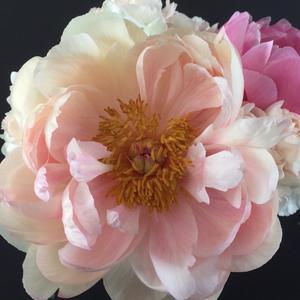 The Flower Podcast
The Flower Podcast
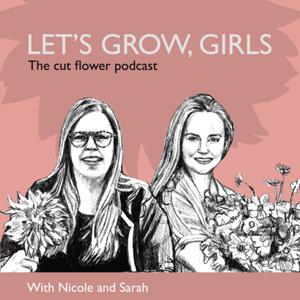 Growing Cut Flowers
Growing Cut Flowers
 grow, cook, eat, arrange with Sarah Raven & friends
grow, cook, eat, arrange with Sarah Raven & friends
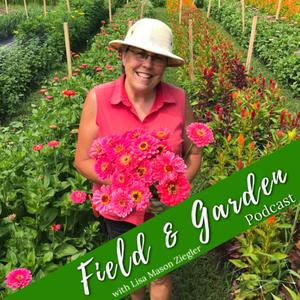 Field and Garden with Lisa Mason Ziegler
Field and Garden with Lisa Mason Ziegler
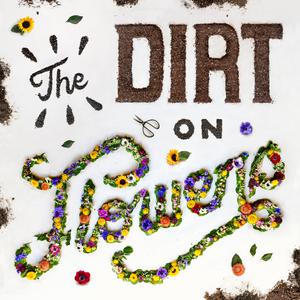 The Dirt on Flowers
The Dirt on Flowers
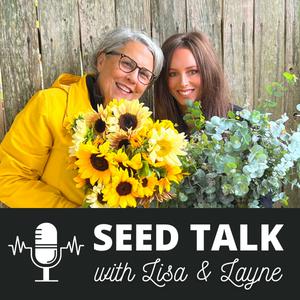 Seed Talk with Lisa & Layne
Seed Talk with Lisa & Layne